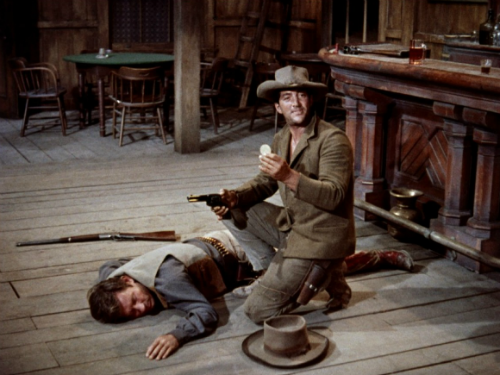
Jonathan Rosenbaum: When did you first write about Howard Hawks?
Shigehiko Hasumi: In 1977, just after he died. At that time, Hawks was so underestimated in Japan that no film magazine wanted an article on him. I published it in a literary magazine.
Jonathan Rosenbaum in conversation with Shigehiko Hasumi1
“But it is impossible to leave Rio Bravo (like El Dorado, another film of Hawks, which resembles it like a brother) without feeling proud of being a man. The people who make these films are not hacks, they are not manufacturers; they are moralists, in the true sense of the word. The films of Hawks, even the comedies that he made, like Man’s Favorite Sport, go much further in the knowledge of man than the so-called underground analyses and studies do. Why? Because Hawks knows what a man is, and that is why he can make films. One cannot make films if he does not like life, if he does not believe, above all, that physical manifestations are privileged. The body does not lie, nor does the human face: this is the strength of the cinema and its health as opposed to literature.”
Alexandre Astruc2
“We didn’t see that Hitchcock, Hawks were old. So we’d say: ‘they’re going to make their last film, which is going to be as beautiful as Beethoven’s last quartets or the Titian’s last paintings.’ We admired old people. It was a slightly strange period. And we were certain that they were, of course, enchanted to see us. So actually it was still a period when the studio system was still there. Each had its Foreign Press department where there’d be someone saying: ‘Listen, there are two completely weird people who’ve just arrived from the Cahiers du Cinéma.’ It had made its way to Hollywood that there was an impossible group of French who had twisted tastes and who preferred Samuel Fuller to Robert Wise – which of course they were right to, but at the time it was scandalous. So the Americans did their job, they’d say, ‘No skin off our back’. They had the means to ask this or that filmmaker if he would kindly receive two young French journalists for an hour. Everybody said yes. So that we ended up all proud, with our completely misplaced questions, completely intellectual, completely foundational, seeing Howard Hawks. Hawks was the guy who had made Rio Bravo, it was the first film I’d written about and it’s stayed an essential film all my life. It’s a film I could talk about for hours because that film has accompanied me. There is a film that looked at me, which saw me as I was, I, as a teenager, and which knew a lot about me, much more than I thought I knew about it. So Howard Hawks was for me my favorite filmmaker.”
Serge Daney3
“It’s not hard to tell you’re watching a Howard Hawks film. Whether it’s a western, a screwball comedy, a drama; the aesthetics are the same: tough men and the women they love (if there are even any women in sight). The women who can’t hang with men who speak with their fists or guns, don’t hang around long. They either like it or lump it. The Hawks ethos was well established as early as 1928’s A Girl In Every Port and solidified in the ‘30s with very little variation.
Rio Bravo brought together the best of Hawks’ elements under one roof. A western with John Wayne, buddies creating a tight cabal of manly manness, a woman who can dish it out as well as she can take it, brawling, gun fighting, and most importantly, a judgmental hero who gets to determine who in the team is ‘good enough,’ while not ‘needing’ any of them.
The story goes that Hawks found the film High Noon so repugnant – a sheriff who spends the film’s entirety looking for someone in town to help him fight a vindictive gang and ends up having to do it on his own, as well as have a woman (gasp) save his life – that he had to make a western that opposed every tenet of the former.”
Wade Sheeler4
- 1Jonathan Rosenbaum, “Dialogue Between Shigehiko Hasumi and Jonathan Rosenbaum on Howard Hawks and Yasuzo Masumura,” in Movie Mutations: The Changing Face of World Cinephilia, ed. by Jonathan Rosenbaum and Adrian Martin (London: Palgrave BFI, 2003).
- 2Alexandre Astruc, “The Sheriff,” KinoSlang, 23 July 2016. [Translated from French by Dorothea Hoekzema. Originally published in Paris-Match, 1108 (1 août 1970) as « Le Shérif: Alexandre Astruc fait rendre justice à Howard Hawks »]
- 3Serge Daney, “Journey of a Cine-Son - Part 1 (with transcript)”.
- 4Wade Sheeler, “Rio Bravo, El Dorado and Howard Hawks’ Degree of Separation”, Pretty Clever Films, 7 March 2014.

